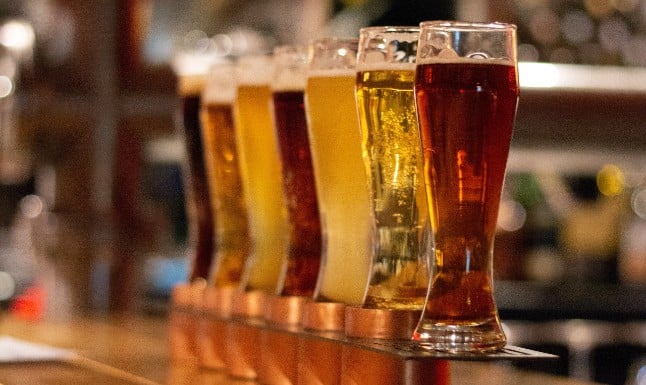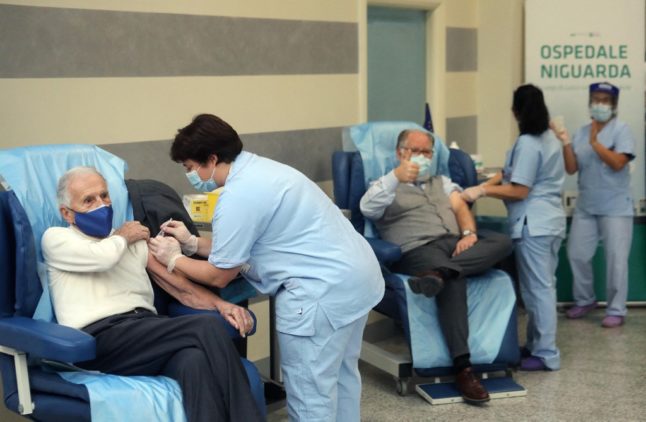“Today we’ve poured out beer for 150,000 to 200,000 Norwegian kroner,” Karl Henning Svendsen, head of Noho Norway, which runs several pubs and restaurants in Oslo, told newspaper E24.
“Just in stock alone I’ve lost about six million kroner,” he added. “The next two weeks I’ll have to toss beer worth two to three million kroner.”
Svendsen and scores of other pub and restaurant owners are literally having to pour beer down the drain because of one of the country’s most controversial restrictions to limit the Covid-19 pandemic in the country.
On Monday Norway’s Prime Minister Erna Solberg Monday announced the easing of some of the strict national measures imposed to curb the transmission of Covid-19 after the festive season.
But the national ban against serving alcohol in pubs and restaurants, however, will stay in place. Bars and restaurants can legally open in Norway, but they cannot serve alcohol. As a result many have simply closed their doors.
“We know that employees in the industry disproportionately exposed to Covid-19,” the PM said during a parliamentary briefing.
With the sale of alcohol banned much of it ends up in the public sewage system, and some of it is poured directly in the venues’ toilets.
In order to avoid a build-up of froth, venues in Norway are now barred from pouring away more than 1,000 litres of beer day.
Different recommendations
The ban is a controversial one.
And just before the announcement of the continued ban on Monday afternoon, Norwegian media reported that the two public health institutions whose advice guide public policy, were recommending different policies.
While the Norwegian Directorate of Health Monday recommended extending the ban for at least two weeks, the Norwegian Institute of Public Health (NIPH) advised lifting it, reported newspaper VG.
The two conflicting pieces of advice were presented to the government last week.
“NIPH recommends lifting the ban against serving alcohol,” it states, before adding, “The Norwegian Directorate of Health thinks the rate of transmission is difficult to assess, and we’re concerned that serving alcohol will increase mobility and social contact between people.”
Existential threat
The government’s adherence to the latter recommendation is a disaster for Norway’s venues and restaurants, warned the Confederation of Norwegian Enterprises (NHO), Norway’s largest organisation for employers.
“This is a ban that threatens the basis of survival for places that serve food and drink and associated businesses across the country,” said the Director General Ole Erik Almlid in a press release.
The organisation points out that the number of Covid-19 cases differs significantly in different areas of Norway so restrictions should be based on local infection rates.
“It’s important to implement measures adjusted to the level of cases. That means implementing less imposing measures in areas with little or no Covid-19,” he said.
Norway has so far reported nearly 60,000 confirmed cases of Covid-19. But 279 of Norway’s 356 municipalities (80 percent) have reported less than 100 Covid-19 infections during the entire pandemic, according to the NIPH.
Some 133 municipalities have reported ten or less cases.
With nearly 16,000 cases, Oslo, meanwhile, accounts for over a quarter of all Covid-19 cases in Norway. Trailing behind is Bergen, with 4,000 cases, about 7 percent of the total.
Local measures
Even if the national restrictions were lifted, hard-hit regions and cities would be able to impose their own restrictions. Oslo, for example, has had a ban on serving alcohol in place since early November.
Some 844 bars and restaurants decided to close due to the ban, about one third, according to newspaper Dagens Næringsliv.
Around ten venues filed for bankruptcy, according to Director of Private Enterprise Gunnhild Hagen in Oslo Municipality.
Thousands of litres flushed
And while the number of new infections are stabilising and restrictions are being lifted, Oslo’s Governing Mayor Raymond Johansen Monday warned that there is nothing warranting lifting the Oslo-restrictions.
“The number of new cases during the start of the year are very high,” he Johansen said, reported newspaper Aftenposten.
“People in anyway need to prepare for the strict measures to continue in the weeks ahead,” he added.
This is bad news for bars and restaurants in Oslo, who have no choice but to continue purging their stock.
Karl-Henning Svendsen at Noho Norway said the alcohol-ban came as a surprise for the industry in November, which had already stocked up on beer to serve guests during the festive season. Tens of thousands of litres is now being funnelled directly into the toilet.
“We received no prior notification,” he told E24.



 Please whitelist us to continue reading.
Please whitelist us to continue reading.
Member comments